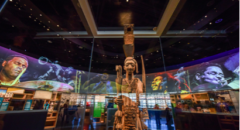
Anxiety disorders are serious medical illnesses that affect approximately 19
million American adults.1 These disorders fill people’s lives with
overwhelming anxiety and fear. Unlike the relatively mild, brief anxiety caused
by a stressful event such as a business presentation or a first date, anxiety
disorders are chronic, relentless, and can grow progressively worse if not
treated.
Effective treatments for anxiety disorders are available, and research is
yielding new, improved therapies that can help most people with anxiety
disorders lead productive, fulfilling lives. If you think you have an anxiety
disorder, you should seek information and treatment.
This brochure will
- help you identify the symptoms of anxiety disorders,
- explain the role of research in understanding the causes of these
conditions, - describe effective treatments,
- help you learn how to obtain treatment and work with a doctor or therapist,
and - suggest ways to make treatment more effective.
The anxiety disorders discussed in this brochure are
- panic disorder,
- obsessive-compulsive disorder,
- post-traumatic stress disorder,
- social phobia (or social anxiety disorder),
- specific phobias, and
- generalized anxiety disorder.
Each anxiety disorder has its own distinct features, but they are all bound
together by the common theme of excessive, irrational fear and dread.
The National Institute of Mental Health (NIMH) supports scientific
investigation into the causes, diagnosis, treatment, and prevention of anxiety
disorders and other mental illnesses. The NIMH mission is to reduce the burden
of mental illness through research on mind, brain, and behavior. NIMH is a
component of the National Institutes of Health, which is part of the U.S.
Department of Health and Human Services.
Panic Disorder
“It started 10 years ago, when I had just graduated from college and started
a new job. I was sitting in a business seminar in a hotel and this thing came
out of the blue. I felt like I was dying.“For me, a panic attack is almost a violent experience. I feel disconnected
from reality. I feel like I’m losing control in a very extreme way. My heart
pounds really hard, I feel like I can’t get my breath, and there’s an
overwhelming feeling that things are crashing in on me.“In between attacks there is this dread and anxiety that it’s going to happen
again. I’m afraid to go back to places where I’ve had an attack. Unless I get
help, there soon won’t be anyplace where I can go and feel safe from
panic.”
People with panic disorder have feelings of terror that strike suddenly and
repeatedly with no warning. They can’t predict when an attack will occur, and
many develop intense anxiety between episodes, worrying when and where the next
one will strike.
If you are having a panic attack, most likely your heart will pound and you
may feel sweaty, weak, faint, or dizzy. Your hands may tingle or feel numb, and
you might feel flushed or chilled. You may have nausea, chest pain or smothering
sensations, a sense of unreality, or fear of impending doom or loss of control.
You may genuinely believe you’re having a heart attack or losing your mind, or
on the verge of death.
Panic attacks can occur at any time, even during sleep. An attack generally
peaks within 10 minutes, but some symptoms may last much longer.
Panic disorder affects about 2.4 million adult Americans1 and is
twice as common in women as in men.2 It most often begins during late
adolescence or early adulthood.2 Risk of developing panic disorder
appears to be inherited.3 Not everyone who experiences panic attacks
will develop panic disorder—for example, many people have one attack but never
have another. For those who do have panic disorder, though, it’s important to
seek treatment. Untreated, the disorder can become very disabling.
Many people with panic disorder visit the hospital emergency room repeatedly
or see a number of doctors before they obtain a correct diagnosis. Some people
with panic disorder may go for years without learning that they have a real,
treatable illness.
Panic disorder is often accompanied by other serious conditions such as
depression, drug abuse, or alcoholism4,5 and may lead to a pattern of
avoidance of places or situations where panic attacks have occurred. For
example, if a panic attack strikes while you’re riding in an elevator, you may
develop a fear of elevators. If you start avoiding them, that could affect your
choice of a job or apartment and greatly restrict other parts of your life.
Some people’s lives become so restricted that they avoid normal, everyday
activities such as grocery shopping or driving. In some cases they become
housebound. Or, they may be able to confront a feared situation only if
accompanied by a spouse or other trusted person.
Basically, these people avoid any situation in which they would feel helpless
if a panic attack were to occur. When people’s lives become so restricted, as
happens in about one-third of people with panic disorder,2 the
condition is called agoraphobia. Early treatment of panic disorder can
often prevent agoraphobia.
Panic disorder is one of the most treatable of the anxiety disorders,
responding in most cases to medications or carefully targeted psychotherapy.
You may genuinely believe you’re having a heart attack, losing your
mind, or are on the verge of death. Attacks can occur at any time, even during
sleep.
Depression
Depression often accompanies anxiety disorders4 and, when it does,
it needs to be treated as well. Symptoms of depression include feelings of
sadness, hopelessness, changes in appetite or sleep, low energy, and difficulty
concentrating. Most people with depression can be effectively treated with
antidepressant medications, certain types of psychotherapy, or a combination of
both.
Obsessive-Compulsive Disorder
“I couldn’t do anything without rituals. They invaded every aspect of my
life. Counting really bogged me down. I would wash my hair three times as
opposed to once because three was a good luck number and one wasn’t. It took me
longer to read because I’d count the lines in a paragraph. When I set my alarm
at night, I had to set it to a number that wouldn’t add up to a “bad”
number.“Getting dressed in the morning was tough because I had a routine, and if I
didn’t follow the routine, I’d get anxious and would have to get dressed again.
I always worried that if I didn’t do something, my parents were going to die.
I’d have these terrible thoughts of harming my parents. That was completely
irrational, but the thoughts triggered more anxiety and more senseless behavior.
Because of the time I spent on rituals, I was unable to do a lot of things that
were important to me.“I knew the ritual








